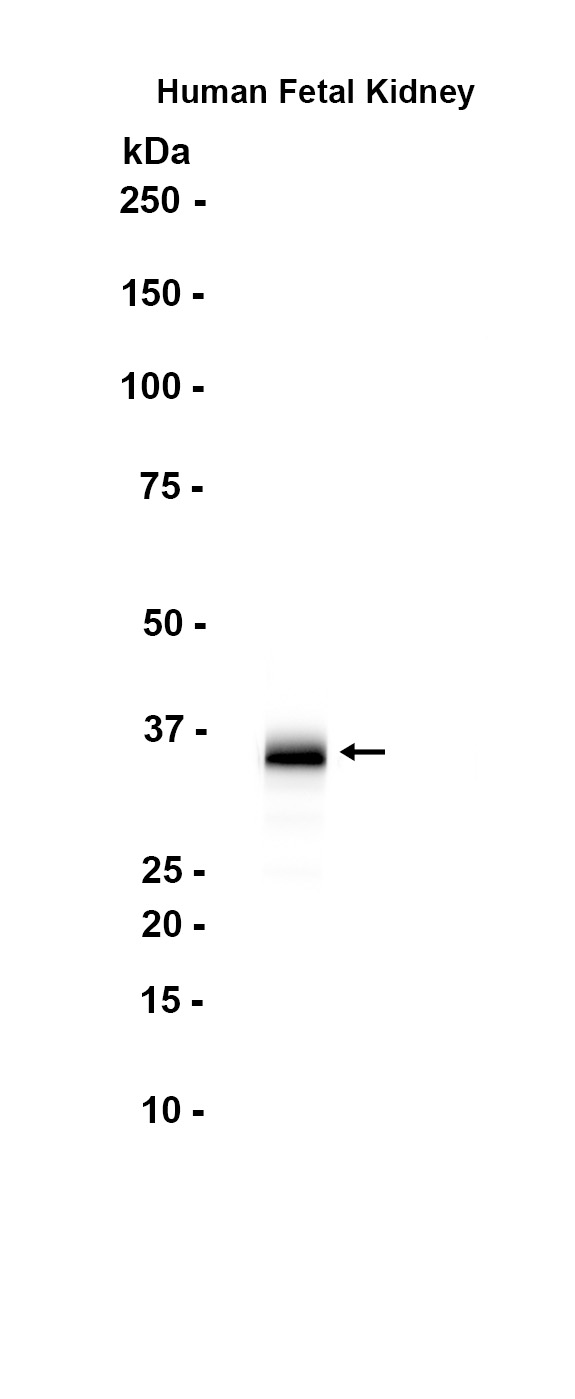ASPA (4G3) Rabbit Monoclonal Antibody
ASPA (4G3) Rabbit Monoclonal Antibody
- 产品详情
- 实验流程
- 背景知识
Application
| WB, IHC, IP |
|---|---|
| Primary Accession | P45381, Q8R3P0, Q9R1T5 |
| Reactivity | Rat, Human, Mouse |
| Clonality | Monoclonal |
| Calculated MW | 35735 Da |
| Gene ID | 443 |
|---|---|
| Dilution | WB~~1:1000 IHC~~1:100~500 IP~~N/A |
| Storage Conditions | -20℃ |
| Name | ASPA (HGNC:756) |
|---|---|
| Function | Catalyzes the deacetylation of N-acetylaspartic acid (NAA) to produce acetate and L-aspartate. NAA occurs in high concentration in brain and its hydrolysis NAA plays a significant part in the maintenance of intact white matter. In other tissues it acts as a scavenger of NAA from body fluids. |
| Cellular Location | Cytoplasm {ECO:0000250|UniProtKB:Q9R1T5}. Nucleus {ECO:0000250|UniProtKB:Q9R1T5} |
| Tissue Location | Brain white matter, skeletal muscle, kidney, adrenal glands, lung and liver. |
For Research Use Only. Not For Use In Diagnostic Procedures.
Provided below are standard protocols that you may find useful for product applications.
BACKGROUND
This gene encodes an enzyme that catalyzes the conversion of N-acetyl_L-aspartic acid (NAA) to aspartate and acetate. NAA is abundant in the brain where hydrolysis by aspartoacylase is thought to help maintain white matter. This protein is an NAA scavenger in other tissues. Mutations in this gene cause Canavan disease. Alternatively spliced transcript variants have been found for this gene. [provided by RefSeq, Jul 2008]
终于等到您。ABCEPTA(百远生物)抗体产品。
点击下方“我要评价 ”按钮提交您的反馈信息,您的反馈和评价是我们最宝贵的财富之一,
我们将在1-3个工作日内处理您的反馈信息。
如有疑问,联系:0512-88856768 tech-china@abcepta.com.























 癌症的基本特征包括细胞增殖、血管生成、迁移、凋亡逃避机制和细胞永生等。找到癌症发生过程中这些通路的关键标记物和对应的抗体用于检测至关重要。
癌症的基本特征包括细胞增殖、血管生成、迁移、凋亡逃避机制和细胞永生等。找到癌症发生过程中这些通路的关键标记物和对应的抗体用于检测至关重要。 为您推荐一个泛素化位点预测神器——泛素化分析工具,可以为您的蛋白的泛素化位点作出预测和评分。
为您推荐一个泛素化位点预测神器——泛素化分析工具,可以为您的蛋白的泛素化位点作出预测和评分。 细胞自噬受体图形绘图工具为你的蛋白的细胞受体结合位点作出预测和评分,识别结合到自噬通路中的蛋白是非常重要的,便于让我们理解自噬在正常生理、病理过程中的作用,如发育、细胞分化、神经退化性疾病、压力条件下、感染和癌症。
细胞自噬受体图形绘图工具为你的蛋白的细胞受体结合位点作出预测和评分,识别结合到自噬通路中的蛋白是非常重要的,便于让我们理解自噬在正常生理、病理过程中的作用,如发育、细胞分化、神经退化性疾病、压力条件下、感染和癌症。






